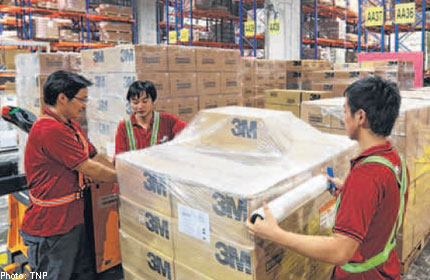
SINGAPORE - The poor will not be left without protection against the haze.
One million N95 masks will be given free to 200,000 lower-income households.
Announcing this, Defence Minister Ng Eng Hen said the masks will be distributed in all constituencies through grassroots organisations.
Dr Ng, who chairs the newly convened Haze Inter-Ministerial Committee (HIMC), said: "We will utilise SAF (Singapore Armed Forces) to help get the masks from the warehouses to the grassroots organisations."
He said the masks will reach the organisations on Sunday and would take a few days to distribute.
"Those with pre-existing diseases and have difficulty getting masks can approach these grassroots organisations."
Speaking to reporters yesterday, Dr Ng said he was doing this "as the Minister for Defence because I recognised the sudden disruption that is caused by the demand".
He said that panic buying was creating an artificial shortage.

"We are dealing with this decisively to push more masks to retail outlets... For a start, NTUC FairPrice will get the masks early next week," said Dr Ng.
FairPrice will cap the price of the masks and limit the number that each person can buy.
Dr Ng said the Manpower and Trade and Industry ministries were working with businesses that need to get the masks to their workers who work outdoors.
He also pointed out that the N95 masks are needed only when the 24-hour PSI level rises above 300, when it is considered hazardous.
The committee also touched on these issues:
24-hour PSI reading v threehour reading
Second Minister for the Environment and Water Resources Grace Fu said it is important for the public to refer to the 24-hour PSI rather than the three-hour reading, which shows "spikes and drops from time to time".
Wearing her Minister of State for Manpower hat, Dr Amy Khor said there was no necessity for work stoppage because "it all depends on the nature of work".
The National Environment Agency said on Thursday that it would issue a daily update on the expected PSI level for the next day.
Dr Ng said the guidelines, which his committee had come up with, do not indicate the hard line for stoppage of work or closure of schools.
He said places like schools, childcare centres, nursing homes and shipyards should take practical steps, like what the hospitals have done.
"They have set up mobile air-conditioners, air-blowers and fans in the B2- and C-class wards, so that windows can be closed and the air in the wards can remain fresh," he said, citing Khoo Teck Puat Hospital (KTPH) as an example.
Hospitals battle-ready
Health Minister Gan Kim Yong said symptoms from the effects of the haze would take several days to emerge.
"We are monitoring the situation. So far, the impact has not been felt immediately but over time, we expect to see more cases, many of which will not require hospitalisation," he said.
But for those who do, Mr Gan assured them that the hospitals are prepared to increase bed capacity if there is a surge in demand.
A check by The New Paper with some hospitals found an increase of between 10 and 30 per cent in the number of emergency medicine department attendances related to the haze.
Dr Francis Lee, who heads the accident and emergency department at KTPH, said: "We have seen a 30 per cent increase in asthma and chest infection cases over the last two weeks."


